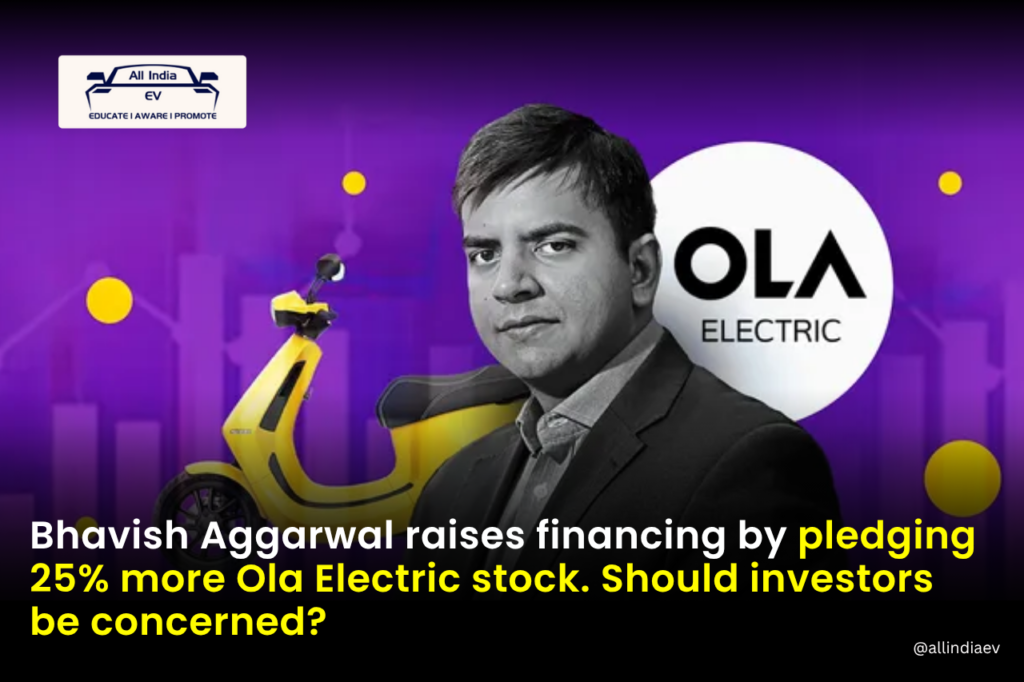
Ola Electric’s chairman and managing director, Bhavish Aggarwal, has once again pledged a larger portion of his stake in the company, sparking renewed concerns among investors about founder leverage and shareholder risk.
According to exchange filings, Aggarwal has increased his pledged holdings from 8.09% in June 2025 to 10.11% in September 2025, effectively pledging nearly 25% more shares to raise a fresh loan for an undisclosed group entity. This marks the third instance since Ola Electric’s August 2024 listing that the founder has used company shares as collateral for personal or external ventures.
More Shares, More Risk
Documents show that Aggarwal pledged 13.38 crore shares (10.11% of Ola Electric’s equity) in the September quarter, up from 10.71 crore shares (8.09%) in the previous quarter. The collateral has been placed with Aditya Birla Capital to secure funding for an unnamed group company.
This means that over one-tenth of Aggarwal’s total 30.02% holding in Ola Electric is now encumbered, heightening investor anxiety.
Previously, Aggarwal pledged shares in November 2024 and February 2025 to entities including Axis Trustee Services, Avendus Structured Credit Fund II, Avendus Finance Pvt. Ltd., and InCred Credit Opportunities Fund I — reportedly to fund his private AI startup, Krutrim.
Investor Red Flags Rising
While promoters often pledge shares to raise capital, Aggarwal’s repeated pledging for non-Ola entities is being seen as a potential red flag. If the borrower defaults, lenders could sell the pledged shares, depressing the company’s stock price.
Analysts compare this to Elon Musk’s 2022 pledge of Tesla shares to finance his Twitter (now X) acquisition — a move that led to volatility in Tesla’s stock.
Ola Electric’s shares have already fallen 43% since listing and over 36% since Aggarwal’s first pledge in November last year. In June, Bloomberg reported that Aggarwal had to top up ₹20 crore worth of collateral after the company’s stock price dipped below ₹50.
Financial Pressure Mounts
Adding to investor unease, Ola Electric recently revised its FY26 revenue guidance downward by nearly a third — from earlier projections to ₹3,000–3,200 crore. The downgrade triggered two consecutive 5% declines in the company’s stock within a single week.
At the same time, Ola Electric is working to improve liquidity and reduce liabilities. The company’s board has approved a ₹1,500 crore equity fundraise, following the issue of ₹1,700 crore in non-convertible debentures (NCDs) just five months earlier to refinance existing debt.
As per regulatory filings, total debt and interest obligations due by FY30 amount to approximately ₹2,114 crore.
Founder’s Outlook
During Ola Electric’s June-quarter earnings call on July 14, Aggarwal acknowledged the debt situation, stating,
“We do have some debt obligations… We will be refinancing some of that debt, not the term loans, but some of the corporate debt that we had taken before our IPO.”
However, with increasing personal leverage and declining stock performance, investors remain cautious. Many are now watching closely to see whether Aggarwal’s financing strategy could impact Ola Electric’s long-term stability and shareholder confidence.
Comment by Author
Bhavish Aggarwal’s growing share pledges highlight the fine line between entrepreneurial ambition and investor confidence. While raising funds through pledged shares is not uncommon, the recurring use of Ola Electric’s equity for external ventures amplifies concerns about founder risk and corporate governance.
As Ola Electric navigates falling stock prices, revised revenue guidance, and mounting debt, sustained transparency and prudent financial management will be crucial to restoring market trust. The company’s next steps — in balancing growth aspirations with fiscal discipline — will determine whether this bold strategy fuels innovation or further strains investor sentiment.










